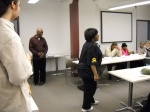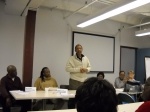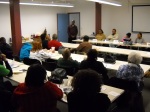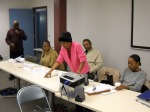Within minutes, the “Bullshit” button went off. A shrill, electronic voice drowned out a US Bank bureaucrat. That’s how the third meeting between US Bank executives, ESOP staff and homeowners started out Thursday afternoon.
Mark Seifert, ESOP’s executive director, sat in a suit and tie at one end of the conference table in ESOP’s downtown Cleveland office, across from two US Bank reps and next to a conference call line filled with US Bank loss mitigation officers. Also around the table were four homeowners and ESOP board members. In the middle of the table was a battery-powered button that read “Bullshit.” ESOP staff and community organizers flanked the outer ring seats. The packed room, which smelled vaguely of chicken wings and potato salad, was warm. A floor fan hummed along the side. Posters festooned with sharks and bank CEO cellphone numbers hung everywhere.
The question at hand was why US Bank took months, if not years, to process loan modifications, many of which ended in denial. All this after the bank was lauding its implementation in December of a brand new “team” (the ones on the phone) dedicated to working with non-profits like ESOP.
“We get expired pay stubs in homeowners’ applications,” the US Bank rep said, trying to explain the delay. Seifert’s ruddy complexion turned scarlet.
“That’s bullshit,” Seifert screamed, his fist landing on the table. “I know we send you complete, up-to-date files. I would fire my staff if that wasn’t happening.”
“There is no need to take that tone,” the man on the phone said. But that tone remained in the room, with the “bullshit” button going off a few more times during the two-hour meeting. The tensions were indicative of just how bad US Bank is when it comes to loan modifications.
“What you’re doing is not working,” said Inez Killingsworth, ESOP’s Board President. “We have over 100 files still open. Listen to the homeowners. Let them show you your process is not working.”
With that, homeowner Deborah Matthews, who had called in from Russell’s Point, Ohio, began. Both Deborah and her husband lost their jobs in early 2008. Deborah found work again, but it only paid half of what she’d earned before. Her husband continued to collect unemployment, also a fraction of his salary. As they fell behind on their mortgage, the Matthews called US Bank for help. They were relieved when the bank told them they could make reduced payments as part of partial modification. Shortly afterward, foreclosure papers arrived, to the Matthews’ shock. US Bank had not applied any of their payments and billed them 18 months behind, with late fees to boot. A bank rep told them their house would be sold in January and they should move out. So the Matthews did, only to learn that was incorrect and that US Bank would re-open their modification file. They lost even more money when they gave up their rental lease and moved back into a house that had by now suffered broken pipes and more. Before continuing, Deborah came to ESOP to help her. All she wanted was to stay in her home with a reduced payment plan until the family got back on its feet.
ESOP submitted Matthews’ file on March 23 and received a rare confirmation from US Bank that it was received. So ESOP now wanted to know US Bank’s assessment. It had been only two weeks, yet none of the team members could recollect Matthews’ application.
Seifert looked up at Melissa Borino, a veteran of helping banks work with community groups. Borino had joined US Bank a year ago as a vice president of community development, to help the company with this kind of problem exactly. She’d come in from Chicago for this meeting. Now, she had a pained expression on her face.
“This is exactly what I’m talking about,” Seifert said. Borino nodded. From there, Borino learned that “weekly reviews, ” agreed to in a December meeting, were nothing more than US Bank sending ESOP a list of applications “under review.” The next ESOP knew, the status was changed to “Denied” or “Closed,” without further discussion with ESOP. (With many other lenders, it is standard practice for ESOP to hold weekly meetings in which ESOP counselors take the lead in putting files forward. This allows counselors to highlight which files need attention and make sure banks deal with red flags before they turn into foreclosures.)
Towards the end of the meeting, ESOP homeowners and board members were referring to US Bank’s special loss mitigation officers as the “dream team.” Borino discovered that her “dream team,” less than 20 minutes away in suburban Bedford, was routinely denying modifications and late fee waivers because of a too-strict reading of rules and guidelines.
That alone highlighted how this crisis calls for an end to straitjacketed thinking. Foreclosures aren’t the industry-comfort zone of 5 percent any more. They are far, far beyond that.
As the meeting came to close, Borino was apologetic. She said she had taken lots of notes and needed to investigate the situation further. She thanked the homeowners around the table. Deborah Matthews was promised a call by the end of the day. Then Borino wanted to know where Bedford was and the quickest way to get there.
TO BE CONTINUED…
(I’ll post updates to Deborah Matthews’ predicament and the rest of US Bank’s response as they come in.)
NOTE: A lot more happened at yesterday’s meeting with US Bank, much of it the homeowners who confronted the executives. Their stories are powerful and speak volumes. I will recount some of them in subsequent, separate posts over the next week. Look for:
“You refused money from a social service agency which had offered to pay half my mortgage!” — Susan Sleighter, Masillon, Ohio
“As soon as I get a job, I’m dumping US Bank.” — Pat Carroll, Mansfield, Ohio
There was one victory during the meeting. US Bank’s Borino agreed to accept $5,000 in rescue funds and give Erick Baker in Cleveland, Ohio, his house back, free and clear. It was a testament to the need for empathy, creativity and a person with authority to immediately approve an out-of-the-box solution.










